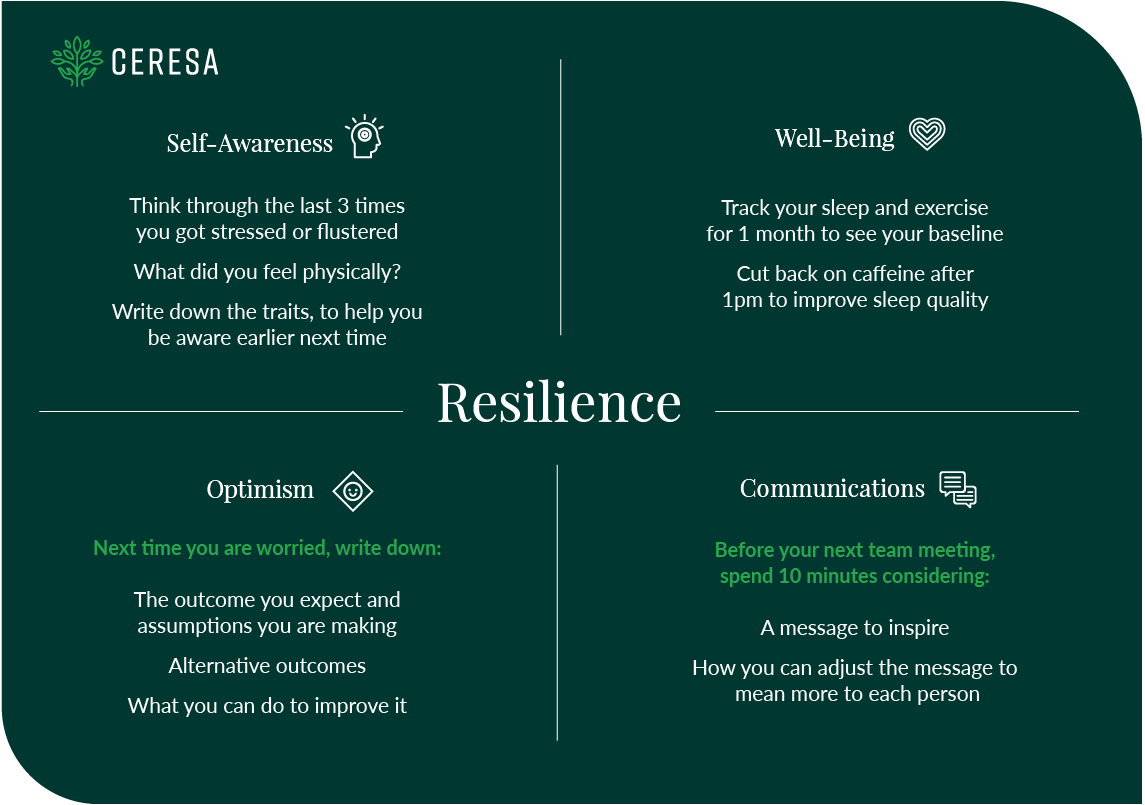How to build resilience: 4 traits every leader should practice
The best leaders are resilient leaders—and it starts with investing in yourself so that you can show up consistently for those around you.
By Anna RobinsonHow to build resilience: 4 traits every leader should practice
How do you invest in yourself, so you can be in service of others and be consistent for those around you?
This is the heart of resiliency.
There has never been a time in modern history where resiliency was so critical – for everyone – but acutely for leaders in the workplace. The following fundamental shifts resulting in the “New World of Work” mean people want more from their employer and their leaders.
Flexibility. Purpose. Inspiration. Belonging. Opportunities to grow. To feel taken care of.
And we know that employees are more than willing to switch jobs if necessary. Many of you are experiencing your own personal demands, mental health challenges, and strategic business challenges at unprecedented levels.
So, how do you build your resiliency to show up and lead your team consistently and from the heart?
Ceresa supports members in building these four critical traits of resiliency:
1. Self-awareness
Understanding your strengths, where you tend to falter, and how you react to times of stress, disappointment or excitement, is critical to resiliency. Research studies in sports have long associated self-insight with resiliency and performance. This allows you to leverage your strengths, recognize potential triggers or tell-tale signs of stress reactions, and pre-emptively employ adaptive strategies. This self-regulation is key to being able to show up as you want with your team, especially in harder times. Self-insight is also a strong contributor to optimism, which is a critical leadership attribute in tough moments.
2. Well-being
The best leaders carve out space, sleep, and time to rest, think and prepare. Only 40% of the population gets inadequate sleep. Yet sleep deprivation results in a hyper-reactive amygdala resulting in anxiety, irritability, and lack of empathy. Sleep deprivation impacts executive functioning, reduces our ability to control impulses, and leads to lower optimism. All of these contribute to lower resilience as a leader.
3. Optimism
Winston Churchill famously said, “Success is not final, failure is not fatal: it is the courage to continue that counts.” Two critical factors come to play here. The ability to bring optimism to any situation is key to inspiring others. Optimism also increases your life expectancy. Many researchers have found optimism to be the biggest predictor of resiliency. Related, is your ability to find perspective. Those who find meaning in adversity tend to be healthier. Positive outlooks also help you notice more positive things creating an “upward spiral of positive emotions”. By contrast, negative emotions result in being defensive, which shuts you off to new possibilities as they are perceived as risks. If you find optimism does not come naturally, do not despair. While some people are born with a greater tendency towards optimism, it can also be learned.
4. Communications
A leader has a real impact by inspiring others and mitigating stress in the face of challenges. This is how a leader translates resiliency to a team. These communications must be consistent and personalized to each person. You must be well-versed in how to adjust your communications quickly to meet the needs of each person and strike a positive tone.. Furthermore, positive self-talk is one of the most important aspects of building your own confidence, optimism, and resilience. This in turn provides the grounding for deliberate, calm, inspiring communications with your team.
These four critical traits of resiliency all take work. Practice. Focus. Resiliency is not binary. Much like other aspects of “balance”, it is a journey. You continue to build and grow your resiliency. At times, you will likely find your resiliency dipping, and need to reinvest to build it back up…. to get back on that journey.
That does not mean you have to carve out 2 hours of meditation or journaling each morning.
But it does require intentionality and practice.
Ceresa enables world-class professional development without breaking your budget. Members enjoy personalized learning journeys, with the tools, content and community you need to harness resiliency and other leadership skills, including:
Self-awareness: Ceresa coaches guide you through 360 feedback and personal assessments.
Resilient Leadership: our mastery series will guide you through the journey to become a resilient leader for your team.
Well-being: curated experts will help you prioritize your self-care, nutrition, sleep and mental health.
Communication skills: training content and exercises will help you practice your communication and influencing skills, while mentors will share their experience of building more sophisticated communications.
We’d love to connect with you and talk more about how Ceresa can help you and your teams.
Does your current approach incorporate four critical traits of resiliency to develop your team?
Schedule a call below with Ceresa to learn how to bring world-class professional development to all your people, without breaking your budget.


